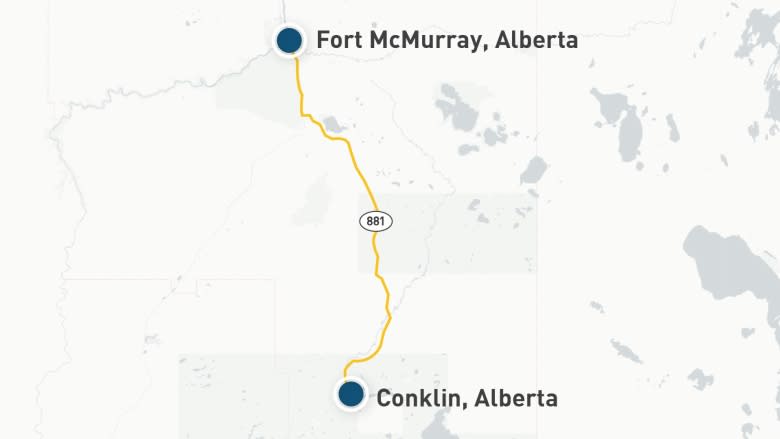'Absolutely dismal': Northern Alberta Métis community grapples with housing crisis
A northern Alberta Métis community surrounded by oilsands operations says it is battling a housing and homelessness crisis.
A draft report says the hamlet of Conklin, 150 kilometres south of Fort McMurray, is in need of emergency housing.
The community of fewer than 200 residents is surrounded by oil production sites that employ in-situ steam assisted gravity drainage, or SAGD operations.
But report author Peter Fortna, a consultant with Willow Springs Strategic Solutions Inc., says residents aren't seeing the benefits of oilsands development.
"Every person deserves a safe place to rest their head at night," Fortna said. "The fact that that doesn't exist in Conklin, nor does it exist in other communities in the region, is just heartbreaking and difficult."
The report classifies homelessness as a persistent lack of affordable housing. People without adequate housing end up couch surfing or living in overcrowded conditions where two or three families are under one roof.
Some residents have been forced to leave the community due to the housing crisis, the report says, and some end up living on the streets in larger cities like Fort McMurray or Edmonton.
Several families are squatting in trailers without electricity or water and sewer, the report says.
Rural and Indigenous communities forgotten
Fortna didn't count the total homeless population within Conklin and is calling on the provincial government to do an official count.
The findings were based on focus groups conducted in 2017 with 60 people — youth, adults and elders who all said they were affected by the crisis.
Participants blamed the history of neglecting Indigenous property ownership and the failure to allocate more land from the province and municipality to private owners.
The report will get its official release in April.
It was commissioned by the Conklin Resource Development Advisory Committee, which represents Conklin Métis Local 193 and the Conklin Community Association on issues related to government and industry.
Shirley Tremblay, president of the Métis local, said rural communities in the oilsands region have never received their fair share of wealth.
"The government policies have only been for the urban areas," Tremblay said.
Solutions to the crisis
The report calls for immediate permanent housing and then the development of Indigenous-driven housing strategies.
Henry Hunter, president of the Wood Buffalo Housing Development Corporation, said he sees a need for more low-cost housing in Conklin.
However, affordable housing is out of the mandate of the corporation, which only provides market-priced homes.
"The living conditions for some in Conklin are absolutely dismal," Hunter said. "So definitely there needs to be something done."
Hunter said there's a housing need across Wood Buffalo's many communities.
The corporation has asked the province's finance department to allocate money within the 2018-19 provincial budget for a needs assessment study.
Adam Hardiman, spokesperson for the Regional Municipality of Wood Buffalo, said housing is largely a provincial issue. But reducing homelessness is a priority and the municipality is talking with various partners about how to reduce it, he said.
Government officials declined in interview request. In an emailed statement, Samantha Power, press secretary for the Community and Social Services Minister Irfan Sabir, said the government will be meeting with the municipality of Wood Buffalo and the community of Conklin about the issue.
Follow David Thurton, CBC's Fort McMurray correspondent, on Facebook and Twitter, or email him at david.thurton@cbc.ca



